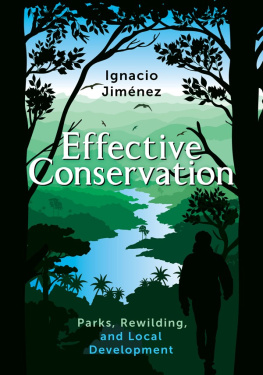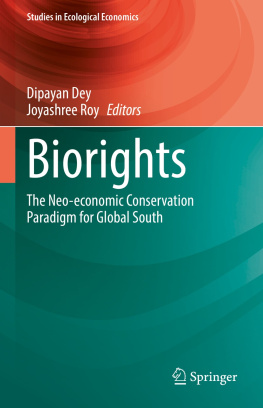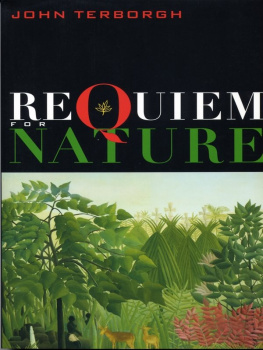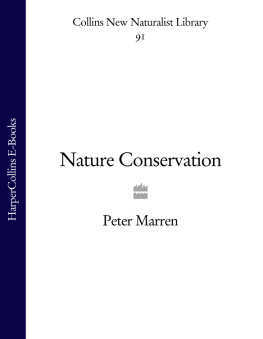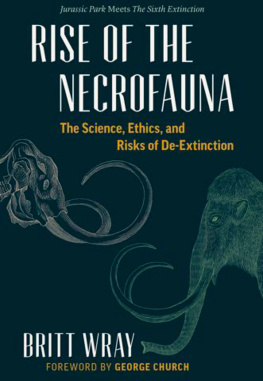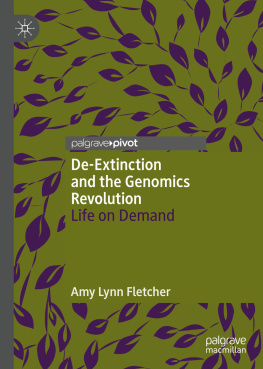Contents

The Conservation Revolution
The Conservation Revolution
Radical Ideas for Saving Nature
beyond the Anthropocene
Bram Bscher and Robert Fletcher

First published by Verso 2020
Bram Bscher and Robert Fletcher 2020
All rights reserved
The moral rights of the authors have been asserted
1 3 5 7 9 10 8 6 4 2
Verso
UK: 6 Meard Street, London W1F 0EG
US: 20 Jay Street, Suite 1010, Brooklyn, NY 11201
versobooks.com
Verso is the imprint of New Left Books
ISBN-13: 978-1-78873-771-5
ISBN-13: 978-1-78873-770-8 (LIBRARY)
ISBN-13: 978-1-78873-772-2 (UK EBK)
ISBN-13: 978-1-78873-773-9 (US EBK)
British Library Cataloguing in Publication Data
A catalogue record for this book is available from the British Library
Library of Congress Cataloging-in-Publication Data
A catalog record for this book is available from the Library of Congress
Typeset in Minion Pro by Hewer Text UK Ltd, Edinburgh
Printed and bound by CPI Group (UK) Ltd, Croydon, CR0 4YY
Contents
This book almost wrote itself. Not quite, of course. But somehow, from the start, we felt that this book had to be written. The seemingly sudden explosion of the Anthropocene conservation debates formed the initial impetus. It contained all the themes and issues we have both been thinking and writing about since the start of our academic lives and allowed us to revisit, rethink and update these in relation to new developments. The call for a new vision for conservation became the books central drive. While trying to critically reflect on contemporary conservation, both of us have often been asked so what is the alternative? This book is the start of an answer. Or rather: the start of a journey to join all those also seeking transformative ways forward, away from the capitalist mess we are all in. This, we believe, is (or should be) the new critical realism: to study, acknowledge and critically debate the messiness of the structures and lived realities of our contemporary political economy; and, on that basis, to contribute to imagining, envisioning and practising alternative ways forward. In a nutshell, this is the content of the book.
In the process, we were helped, supported and encouraged by many colleagues and friends. Special thanks, first, to Sebastian Budgen at Verso Books. His faith in the project and support through the whole process has been invaluable. Thanks also to all other colleagues at Verso for their support in the publishing process. Many thanks to Dan Brockington, Rosaleen Duffy and Wolfram Dressler for astute comments on (parts of) the manuscript and being a crucial part of the discussions contained in it. (More-than) academic friendships like these are what keep us going. Special thanks to Chris Sandbrook and Kevin Surprise for reviewing the manuscript for Verso. Your comments, critiques and suggestions were critical and helped to bring the manuscript to the next level.
Many other colleagues and friends read parts of the book, attended presentations where ideas in this book were presented and formed part of the networks that carried the ideas in the book forward. Thanks to Sian Sullivan, Jim Igoe, Scott Prudham, Frank Matose, Bill Adams, Lisa Campbell, Catherine Corson, Noella Gray, George Holmes, Alice Kelly, Elizabeth Lunstrum, Maano Ramutsindela, Kartik Shanker, Peter Wilshusen, Kenneth MacDonald, Murat Arsel, Danielle Hirsch, Zachary Anderson, Glenn Banks and many other colleagues and friends, including those in the amazing POLLEN network (politicale- cologynetwork.org ). Thanks also to the CON-VIVA family, which will aim to explore, refine and concretize some of the ideas in this book in the next years: Mathew Bukhi Mabele, Wilhelm Kiwango, Anja Nygren, Sanna Komi, Dan Brockington, Rosaleen Duffy, Judith Krauss, Stasja Koot, Robert Coates, Katia Ferraz, Mariana Landis, Alexandre Reis Percequillo, Laila Sandroni, Ronaldo Morato, Rogerio de Paula, Silvio Marchini, Cntia Angelieri, Peter Alagona, Alex McInturff, Kate Massarella, Coenraad Krijger, Gert Polet, Femke Hilderink-Koopmans, Amy Dickman and all other colleagues and partners who are part of and support the project. For those interested in knowing more and becoming a part of it, see: convivialconservation.com .
Within Wageningen University, thanks to our colleagues and friends in the Sociology of Development and Change group, the Rural Sociology group, the Centre for Space, Place and Society, the Forest and Nature Conservation group and others. Special thanks to the fantastic and inspiring postdocs, PhD and MSc students we have the pleasure to work with, and to the students who participated in the 2017 Wageningen Political Ecology summer school where the book was presented and discussed. Special thanks also to Nalini Gangabisoensingh, Marielle Takes and Sanne Hannink for support.
What makes this book truly revolutionary, in our eyes, is the love and support from our close friends and families, and especially Stacey and Arana, and Julia, Tenaya and Lori. You make all of this meaningful and possible.
A revolution in conservation is brewing. This is not necessarily an event that makes everything different. Rather, a growing urgency and pressure are building towards radical change. Even a cursory glance at conservation debates over the last decade shows that pressures on species and ecosystems and hence the conservation community concerned with saving them are extremely high and are certain to further increase. It has led to a growing realization that incremental, reformist change will not suffice to alleviate the pressure. The question for conservation is no longer whether we want or need radical change. It is brewing regardless. It is already happening. The question is how we understand the pressures and help direct imminent radical change towards something positive. This is the crossroads facing the conservation community today.
Now, the statement that conservation is at a crossroads has been true for a long time. Conservation biology, for example, has consistently portrayed itself as a crisis discipline. Making hard choices in complex contexts has always been part of the conservation equation. Yet the recent discussions concerning the advent of the Anthropocene seems to have upped the ante considerably, rendering already hard choices even more difficult. In this brave new world, ongoing debate concerning appropriate conservation strategies has moved beyond the longstanding people versus parks dispute that had previously divided conservationists for decades. In the last decade, a number of radical alternate approaches to contemporary mainstream conservation have emerged. The two most prominent of these are new or Anthropocene conservation, on the one hand, and the neoprotectionist or new back-to-the-barriers movement, on the other. Together, these have caused quite a rift among conservationists.
According to new conservationists, life in the Anthropocene places an unprecedented and special burden on humans. Homo sapiens are seen to have changed global ecosystem functioning to such a degree that they now have to cultivate and manage the earth as one immense rambunctious garden. Hence, what makes new conservation radical is that it aims to do away with conservations long-standing infatuation with wilderness and associated ideas about pristine nature as well as the conviction that these can be conserved as untouched protected spaces, away from humans. Nature and ecosystems always change, new conservationists argue. So why not embrace the new natures that are currently evolving and use them to support human development?


